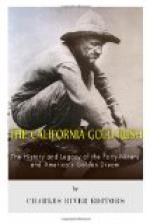Johnson promptly issued his proclamation. The leaders, in high feather, as promptly turned to the federal authorities for the assistance they needed. As yet they did not ask for troops but only for weapons with which to arm their own men. To their blank dismay General Wool refused to furnish arms. He took the position that he had no right to do so without orders from Washington. There is no doubt, however, that this technical position cloaked the doughty warrior’s real sympathies. Colonel Baker and Volney Howard were instructed to wait on him. After a somewhat lengthy conversation, they made the mistake of threatening him with a report to Washington for refusing to uphold the law.
“I think, gentlemen,” flashed back the veteran indignantly, “I know my duty and in its performance dread no responsibility!” He promptly bowed them out.
In the meantime the Executive Committee had been patiently working down through its blacklist. It finally announced that after June 24 it would consider no fresh cases, and a few days later it proclaimed an adjournment parade on July 4. It considered its work completed and the city safe.
It may be readily imagined that this peaceful outcome did not in the least suit the more aristocratic members of the Law and Order party. They were a haughty, individualistic, bold, forceful, sometimes charming band of fire-eaters. In their opinion they had been deeply insulted. They wanted reprisal and punishment.
When therefore the Committee set a definite day for disbanding, the local authorities and upholders of law were distinctly disappointed. They saw slipping away the last chance for a clash of arms that would put these rebels in their places. There was some thought of arresting the ringleaders, but the courts were by now so well terrorized that it was by no means certain that justice as defined by the Law and Order party could be accomplished. And even if conviction could be secured, the representatives of the law found little satisfaction in ordinary punishment. What they wanted was a fight.
General Sherman had resigned his command of the military forces in disgust. In his stead was chosen General Volney Howard, a man typical of his class, blinded by his prejudices and his passions, filled with a sense of the importance of his caste, and without grasp of the broader aspects of the situation. In the Committee’s present attitude he saw not the signs of a job well done, but indications of weakening, and he considered this a propitious moment to show his power. In this attitude he received enthusiastic backing from Judge Terry and his narrow coterie. Terry was then judge of the Supreme Court; and a man more unfitted for the position it would be difficult to find. A tall, attractive, fire-eating Texan with a charming wife, he stood high in the social life of the city. His temper was undisciplined and completely governed his judgment. Intensely partisan and, as usual with his class, touchy on the point of honor, he did precisely the wrong thing on every occasion where cool decision was demanded.




